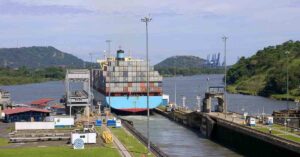
US Navy Collaborates With University Of Houston To Study Glow Sticks For Biothreat Detection
February 8, 2024
Singapore Implements Strict Bunker Fuel Quality Standards After Contamination Incident
February 8, 2024
The Panama Canal officials have stated that there are no immediate plans for further vessel transit restrictions until at least April. Ilya Espino, the deputy administrator, announced that an assessment of the water levels at the end of the dry season will take place in April to identify any actions that may be required. The extreme drought last year forced the canal to reduce the daily number of vessels going through. Fortunately, December rainfall allowed the scheduled restrictions for January to be suspended.
There is a greater demand for Panama Canal transit due to recent attacks on ships in the Red Sea, which have forced ship owners to choose longer routes. Espino stated that until April, the canal will continue allowing 24 authorised transits daily. Plans call for a gradual increase in the number of daily slots. When the rainy season arrives in May, the goal is to return to the standard 36 vessels daily. If rainfall is insufficient, further restrictions on daily transit or vessel draft may be implemented.

Vessels with a maximum draft of 44 feet are now allowed to prevent potential load reduction for numerous ships. Although container ships are given priority, transit limitations have significantly impacted bulk carriers. The need for the canal to maintain water levels has kept it from taking in more demand due to the interruptions in the Red Sea.
Furthermore, logistics specialists warn that the Red Sea attacks and prolonged Panama Canal drought might severely disrupt international trade. Diego Pantjoa-Navajas, VP of Amazon Web Services Supply Chain, emphasised the unprecedented influence on supply chains. He predicted scarcity of goods and higher prices for different products, highlighting the effects on international trade networks. Companies such as Inter Ikea Group have already issued delays and availability alerts for specific products due to these problems.
According to McKinsey, over 14,000 ships passed through the Panama Canal in 2023. Pantjoa-Navajas highlighted the urgent need for solutions to these problems as existing solutions are insufficient. The combined consequences of these interruptions are projected to cause slower delivery of commodities, affecting industries ranging from electronics to oil.
Reference: Reuters, Fox Business
Panama Canal Authorities Postpone Vessel Transit Restrictions Until April appeared first on Marine Insight – The Maritime Industry Guide
Source: Maritime Shipping News


